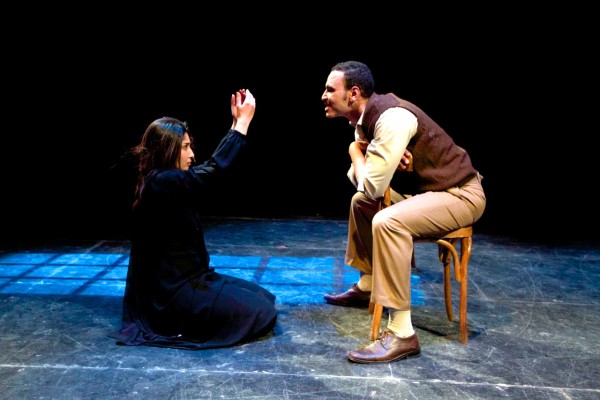Battle of the wills in two-actor play El-Estegwab
BY HANNAH ALTMANN
![In El-Estegwab (The Interrogation), two people go head to head before a reversal of fortune turns the victim into the victor [MARWA SEOUDI]](http://www.auccaravan.com/wp-content/uploads/2015/02/unnamed-17-copy-e1424693001703.jpg)
“I chose this play because I wanted to do a [production] with a very small cast so that would allow me to take two students, work intensely with them and allow them to develop as characters and develop their skills, which would not be possible if I were dealing with a cast of 12, ” El-Lozy said.
Set in 1954 during the British occupation of Egypt, the play depicts an interrogation between a poor mother of two and Zanaty, a police officer working for the British.
The mother is accused of hiding explosives underneath her bed and is subsequently being threatened with execution as punishment.
Throughout the play, the policeman uses radio broadcasts to threat impending execution to whomever is found in possession of explosives or weapons.
The woman, who is repeatedly terrorized and harassed by the officer, pleads her innocence claiming she had no knowledge of the explosives.
Consequently, the officer presents her with an ultimatum – he will either kill her eldest or her youngest son to spare her life.
The seriousness of the interrogation was portrayed with devious simplicity. The stage decoration consisted only of a desk with a radio and microphone and interrogation chair.
Lighting also played an important role, as the stage was kept mostly dim and grim. The costumes and stage layout were meticulously executed. Zanaty wore beige and had a prominent moustache, perfectly projecting his role.
The mother, in comparison, always looked to the ground and regularly adjusted her head scarf to appear modest.
One of the highlights of the play was the sudden and loud sound of a bomb. Lighting during those few seconds was hazy, while dust fell from the ceiling and the lamp swung from the impact.
There’s a twist in the plot when Zanaty hears on the radio that the British have withdrawn from Egypt, which means that he is now out of work and the woman is free.
![[MARWA SEOUDI]](http://www.auccaravan.com/wp-content/uploads/2015/02/unnamed-1-copy-e1424695295686.jpg)
After mulling over his thoughts, he decides to broadcast chants in support of the free Egyptians hoping that this gesture will keep him and his family from harm.
The woman is quick to notice that Zanaty has revealed a hidden weak side. Emboldened, she expresses sarcasm at his situation.
The reversal of fortunes – and perhaps fates – is audience member Abdelazim Soliman’s favorite scene.
“The last four or five minutes after the conversion [is my favorite part] because it changed 100 percent from this side to this side,” said Soliman, a Cairo University graduate.
Alia Abdoun, an English and comparative literature junior, said her favorite part of the play focused “on the mother telling her story while the lights are dimmed”.
“This was very moving because the spotlight was on her so there was no distraction from what she as saying. The actress played the part really well and the emotion that she put into this monologue gave me chills.”
The mother is presented as an inferior character throughout the play, sitting mostly in her chair while Zanaty strides with confidence.
When Zanaty makes fun of her and asks her where she’s from and inquires about her background, the surroundings gradually darken until the only thing that one can see is her brightly lit face.
Her monologue continues for a few minutes, captivating the audience. Once she’s done, the lighting quickly reverses to the way it was before and Zanaty’s laughter fills the room.
Ahmed Saleh, a junior majoring in theatre, is the son of late actor Khaled Saleh and describes the intense five weeks of rehearsals and working with El-Lozy as a “great experience”.
He then adds, “it’s my first show, so it was a lot of pressure to be alone on the stage and memorizing all the lines. That’s what I love doing.”




